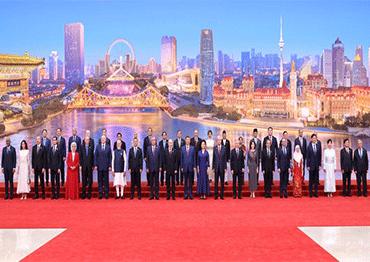hina hosted the 25th Meeting of the Council of Heads of State of the Shanghai Cooperation Organization (SCO) in Tianjin from August 30 to September 1, during which Chinese President Xi Jinping proposed the new Global Governance Initiative (GGI).
In a speech at the expanded SCO Plus meeting on September 1, Xi said “the world has found itself in a new period of turbulence and transformation, and global governance has come to a new crossroads.”
“History tells us that at difficult times, we must uphold our original commitment to peaceful coexistence, strengthen our confidence in win-win cooperation, advance in line with the trend of history, and thrive in keeping pace with the times,” Xi said, according to a release from China’s Ministry of Foreign Affairs.
There are five highlighted points in the GGI: adhering to sovereign equality, abiding by international rule of law, practicing multilateralism, advocating a people-centered approach and focusing on taking real actions.
According to the Foreign Ministry, attendees at the Tianjin Summit spoke highly of and expressed strong support for the GGI, noting that the world is in urgent need of more effective governance concepts and systems that are facing an array of challenges when the global governance deficit is widening and unilateralism is on the rise.
Xi elaborated on the GGI’s main points at a virtual BRICS summit held on September 8, stressing that BRICS countries, standing at the forefront of the Global South, should act on the BRICS Spirit of openness, inclusiveness and win-win cooperation to improve the global governance system through reform to tackle more effectively the common challenges for humanity.
At a press conference after the Tianjin Summit, Chinese Foreign Minister Wang Yi summarized the outcomes, saying the Tianjin Summit has formulated a development strategy for the SCO in the next 10 years, which stresses that member states will uphold the Shanghai Spirit, adhere to mutually beneficial cooperation, help each other succeed and make more contributions to building a multipolar world.
Wang said the Tianjin Summit has sent a just voice for defending the achievements of victory in World War II by issuing a special statement that calls on the international community to learn from history, uphold the correct historical perspective of World War II and defend the UN-centered international system.
Wang revealed that the Tianjin Summit has expressed a fair stance in support of the multilateral trading system, with six pragmatic cooperation platforms established and six action plans for high-quality development worked out, covering energy, green industry, the digital economy, artificial intelligence, technological innovations and higher and vocational education.
On September 5, the UN General Assembly adopted a resolution on cooperation between the UN and the SCO.
SCO members also signed agreements to establish four security centers: the Center for Countering Security Challenges and Threats, the Information Security Center, the Center for Combating Transnational Organized Crime and the Anti-Drug Center, and agreed to establish an SCO Development Bank. Wang revealed that at the Tianjin Summit, it was decided to merge SCO observer states and dialogue partners into a unified category of “SCO Partners,” for “a more optimized organizational structure, closer cooperation, more efficient operation and a clearer sense of the SCO family.”
At another press conference on September 2, Foreign Ministry spokesperson Guo Jiakun said the SCO has grown into a big family of 27 countries, covering Asia, Europe and Africa, with nearly half of the global population and a quarter of global economic output.
“The successful Tianjin Summit will lead the SCO into a new stage of high-quality development featuring stronger solidarity, coordination, dynamism and productiveness, and will definitely become an important milestone in the history of the organization,” he said.

 Old Version
Old Version